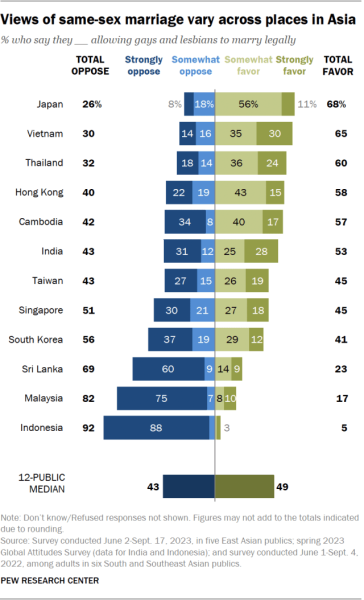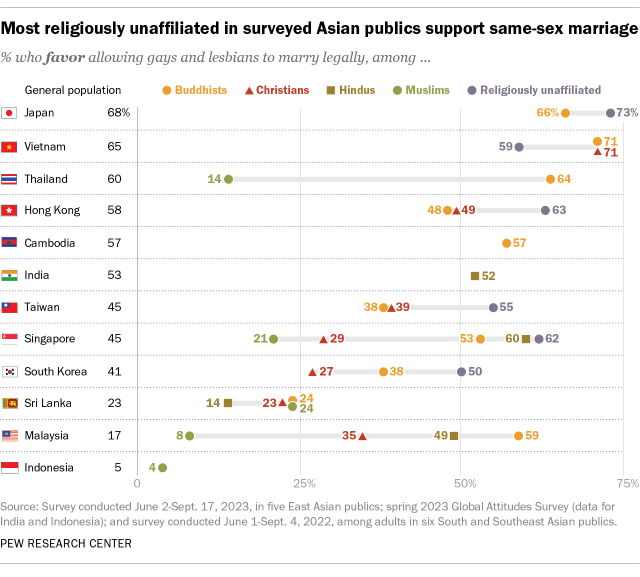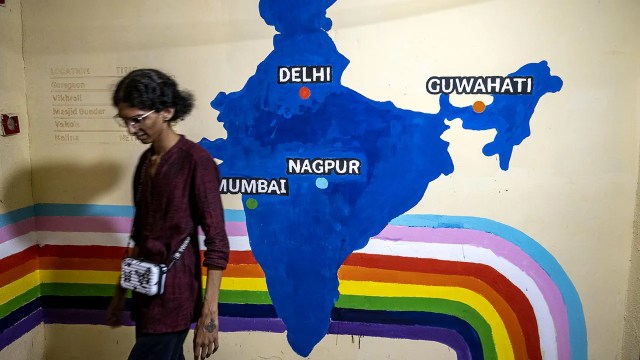India’s Supreme Court ruled against legalizing same-sex marriage on Oct. 17, 2023. (Satish Bate/Hindustan Times via Getty Images)
Same-sex marriage is an active legal and social issue across South, Southeast and East Asia. In the wake of several court rulings on the issue across Asia in the past year, we analyzed data from three recent Pew Research Center surveys to see how people in the region feel about legalizing same-sex marriage.
How we did this
This Pew Research Center analysis focuses on public opinion of legal same-sex marriage in Asia. It also explores how views vary by religion, age and gender. This analysis draws from three surveys conducted across 12 places in Asia.
Data for Hong Kong, Japan, South Korea, Taiwan and Vietnam is from a survey of 10,390 adults conducted from June 2 to Sept. 17, 2023. All interviews in Hong Kong, Japan, South Korea and Taiwan were conducted over the phone. Interviews were conducted face-to-face in Vietnam.
Data for Cambodia, Malaysia, Singapore, Sri Lanka and Thailand is from a survey of 10,551 adults conducted from June 1 to Sept. 4, 2022. All interviews in Malaysia and Singapore were conducted over the phone. Interviews were conducted face-to-face in Cambodia, Sri Lanka and Thailand. Both the survey in East Asia and the one in South and Southeast Asia are part of the Pew-Templeton Global Religious Futures project, which analyzes religious change and its impact on societies around the world.
Data for India and Indonesia is from a 24-public survey conducted this spring. In India, we interviewed 2,611 adults from March 25 to May 11, 2023. In Indonesia, we interviewed 959 adults from March 10 to May 10, 2023. Interviews in both places were conducted face-to-face.
Respondents for all surveys were selected using probability-based sample designs. In Thailand, we conducted additional interviews in the Southern region, which has larger shares who are Muslim. The data in all publics was weighted to account for different probabilities of selection among respondents and to align with demographic benchmarks for adult populations.
Here are the questions used for the analysis, along with responses, and the survey methodology.

A median of 49% of adults in 12 places in Asia say they at least somewhat favor allowing gays and lesbians to marry legally. Another 43% say they oppose legal same-sex marriage, according to surveys conducted between June 1, 2022, and Sept. 17, 2023.
Related: How people around the world view same-sex marriage
Views toward same-sex marriage are most favorable in Japan, where nearly seven-in-ten (68%) say they at least somewhat favor allowing gays and lesbians to marry legally. Japan, the only Group of Seven member that does not legally recognize same-sex couples, has been facing internal and external pressure to do so.
In Vietnam, views on legalizing same-sex marriage are similarly positive – 65% of adults support it. Roughly six-in-ten in Hong Kong (58%) and Cambodia (57%) also favor legal same-sex marriage. A Hong Kong court recently ruled that same-sex couples hold equal inheritance rights, though Hong Kong law does not allow them to marry.
Same-sex marriage was an issue on Thailand’s campaign trail this year. Six-in-ten adults there favor allowing gays and lesbians to marry legally. Around a third of Thais oppose it.
In India, where the Supreme Court recently rejected a petition to legalize same-sex marriage, about 53% of adults say they favor allowing gays and lesbians to marry, while 43% oppose it. (The survey was conducted prior to the ruling.)
In Singapore, no clear majority favors (45%) or opposes (51%) same-sex marriage. Same-sex marriage is not legal in Singapore, and its parliament amended the constitution last year to prevent legal challenges to the definition of marriage.
And in Taiwan, roughly equal shares say they support (45%) and oppose (43%) same-sex marriage. Taiwan is the only place in Asia where same-sex marriage is legal.
In a handful of places in Asia, majorities oppose legal same-sex marriage. In Indonesia, 92% say they oppose it, including 88% who strongly oppose it. Large majorities in Malaysia (82%) and Sri Lanka (69%) also oppose it.
And in South Korea, a slight majority (56%) say they oppose legal same-sex marriage, while 41% favor it. Lawmakers proposed South Korea’s first same-sex marriage bill earlier this year.
Views of same-sex marriage by religion
Though different places have vastly different religious demographics, the religiously unaffiliated tend to be among the most likely to support same-sex marriage.
In the six places where enough religiously unaffiliated individuals were surveyed to analyze their responses separately, half or more of the religiously unaffiliated support legal same-sex marriage. That includes 73% in Japan.
Meanwhile, Muslims and Christians are often, but not always, among the least likely to support it. For instance, while roughly six-in-ten religiously unaffiliated Singaporeans favor same-sex marriage, fewer than a third of Christians and Muslims do.

In Indonesia and Malaysia, the two Muslim-majority places surveyed, Muslims report the lowest support for same-sex marriage of any religious group in any place surveyed. Only 4% of Indonesian Muslims and 8% of Malaysian Muslims support it.
Views of same-sex marriage by age and gender
Across most places surveyed, younger adults are more likely than their older counterparts to support same-sex marriage. This difference is most extreme in Taiwan: 75% of Taiwanese adults under 35 favor it, compared with 33% of those 35 and older.
In five places surveyed, women are more likely than men to support legal same-sex marriage. For example, in South Korea, 48% of women say they favor it, compared with 33% of men. And in Cambodia, 62% of women favor it, compared with 50% of men. In other places surveyed, there are no significant differences by gender.
Note: Here are the questions used for the analysis, along with responses, and the survey methodology.

